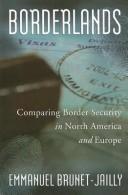| Listing 1 - 3 of 3 |
Sort by
|

ISBN: 9780776606514 0776606514 0887847145 0776627155 9786613285911 9786613667489 0776615513 1280690542 1283285916 0887848931 9780887847141 9780776615516 9780776618517 0776618512 9780776627151 Year: 2007 Publisher: University of Ottawa Press / Les Presses de l�Universit� d�Ottawa
Abstract | Keywords | Export | Availability | Bookmark
 Loading...
Loading...Choose an application
- Reference Manager
- EndNote
- RefWorks (Direct export to RefWorks)
Border security has been high on public-policy agendas in Europe and North America since the September 11, 2001 attacks on the World Trade Centre in New York City and on the headquarters of the American military in Washington DC. Governments are now confronted with managing secure borders, a policy objective that in this era of increased free trade and globalization must compete with intense cross-border flows of people and goods. Border-security policies must enable security personnel to identify, or filter out, dangerous individuals and substances from among the millions of travelers and tons of goods that cross borders daily, particularly in large cross-border urban regions.This book addresses this gap between security needs and an understanding of borders and borderlands. Specifically, the chapters in this volume ask policy-makers to recognize that two fundamental elements define borders and borderlands: first, human activities (the agency and agent power of individual ties and forces spanning a border), and second, the broader social processes that frame individual action, such as market forces, government activities (law, regulations, and policies), and the regional culture and politics of a borderland.Borders emerge as the historically and geographically variable expression of human ties exercised within social structures of varying force and influence, and it is the interplay and interdependence between people's incentives to act and the surrounding structures (i.e. constructed social processes that contain and constrain individual action) that determine the effectiveness of border security policies.This book argues that the nature of borders is to be porous, which is a problem for security policy makers. It shows that when for economic, cultural, or political reasons human activities increase across a border and borderland, governments need to increase cooperation and collaboration with regard to security policies, if only to avoid implementing mismatched security policies.
Boundaries --- Border security --- National security --- Globalization --- Frontières. --- Mondialisation --- Border security -- Europe. --- Border security -- North America. --- National security -- Europe. --- National security -- North America. --- Border control --- Border management --- Cross-border security --- Boundaries. --- Globalization. --- Mondialisation. --- Securite nationale --- Securite frontaliere --- Frontieres. --- Global cities --- Globalisation --- Internationalization --- International relations --- Anti-globalization movement --- National security policy --- NSP (National security policy) --- Security policy, National --- Economic policy --- Military policy --- Borders (Geography) --- Boundary lines --- Frontiers --- Geographical boundaries --- International boundaries --- Lines, Boundary --- Natural boundaries --- Perimeters (Boundaries) --- Political boundaries --- Borderlands --- Territory, National --- Government policy --- Security measures --- Political philosophy. Social philosophy --- Christianity --- Philosophy --- Border security - North America --- Border security - Europe --- National security - North America --- National security - Europe --- Sécurité frontalière - Amérique du Nord. --- Sécurité frontalière - Europe --- Sécurité nationale - Amérique du Nord --- Sécurité nationale - Europe --- national security --- frontier --- United States --- Mexcio --- European Union --- human migration --- Sécurité frontalière --- Sécurité nationale
Book
ISBN: 9780774827065 0774827068 9780774827096 9780774827089 0774827084 0774827092 9780774827072 Year: 2014 Publisher: Vancouver, British Columbia : UBC Press,
Abstract | Keywords | Export | Availability | Bookmark
 Loading...
Loading...Choose an application
- Reference Manager
- EndNote
- RefWorks (Direct export to RefWorks)
The events of 9/11 turned North American politics upside down. US policy makers focused less on how they could better integrate the economies of Mexico, Canada, and the United States and more on security and sovereignty. Security experts tend to view the events that followed within a bilateral framework. Game Changer broadens the canvas examining how America's desire to keep its two borders closed to threats but open to trade has influenced Canada and Mexico. The contributors draw on international relations theory to examine and explain not only how post-911 security policy has transformed relations between the three countries but also how policy makers can reconcile the need for greater regional cooperation in the security realm with national autonomy in other areas of life. By adopting a truly North American, or trilateral, framework, this challenging and authoritative volume suggests new approaches to security in the post-9/11 world.
September 11 Terrorist Attacks, 2001 --- National security --- Attentats du 11 septembre 2001, Etats-Unis --- Sécurité nationale --- Influence. --- Influence --- North America --- Amérique du Nord --- Foreign relations --- Relations extérieures --- Sécurité nationale --- Amérique du Nord --- Relations extérieures --- International relations. Foreign policy --- Polemology --- Canada --- Mexico --- United States --- Foreign relations. --- September 11 Terrorist Attacks, 2001 - Influence --- National security - North America --- North America - Foreign relations --- United States of America
Book
ISBN: 3631572360 9783631572368 Year: 2008 Volume: 7 Publisher: Frankfurt am Main: Peter Lang,
Abstract | Keywords | Export | Availability | Bookmark
 Loading...
Loading...Choose an application
- Reference Manager
- EndNote
- RefWorks (Direct export to RefWorks)
Security, International. --- National security --- Military policy. --- World politics --- Sécurité internationale --- Sécurité nationale --- Politique militaire --- Politique mondiale --- Europe --- United States --- Etats-Unis --- Foreign relations --- Relations extérieures --- Sécurité internationale --- Sécurité nationale --- Relations extérieures --- Western countries --- Foreign relations. --- Security, International --- Military policy --- National security - Europe --- National security - North America --- World politics - 21st century --- Europe - Foreign relations - United States --- United States - Foreign relations - Europe --- Western countries - Foreign relations
| Listing 1 - 3 of 3 |
Sort by
|

 Search
Search Feedback
Feedback About UniCat
About UniCat  Help
Help News
News